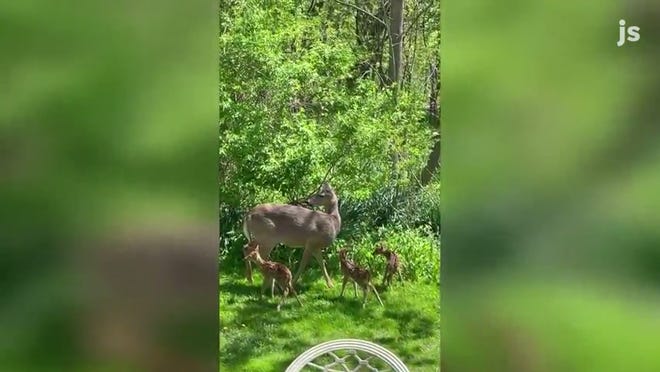
The arrival of spring in Wisconsin also brings a spike in wildlife populations.
Birds, mammals, you name it, young animals are more abundant this time of year than any other.
The season brings also carries an annual reminder from the Department of Natural Resources: “Keep Wildlife Wild.”
The message is part of the agency’s campaign to educate the public that the vast majority of young animals found alone often have adults nearby and are best left untouched by humans.
“Wild animals are valued by many, and it’s important to observe them at a respectful distance to keep them wild and allow for their life in the wild to continue,” the DNR says in its literature. “During the warmer months of spring and summer, human-wildlife encounters increase, especially those involving young wild animals. While most of these encounters are harmless, there are times when well-intentioned people interfere in wildlife situations because they incorrectly assume a young animal is orphaned.”

The DNR expounds on its message with five reasons to not touch or attempt to rescue a young wild animal.
The first is stress, since wild animals view people and domestic animals as predators and are highly stressed by the sights, sounds and smells of being near humans or domestic animals. This stress can cause serious health problems and even death for wild animals, according to the DNR.
Wild animals also have specialized dietary needs that are not easily met in captivity and young wildlife are at a high risk of suffering severe nutritional deficiencies, the DNR says. It also emphasizes wild animals should not be fed human food items.
Disease issues are another reason to leave wild animals in the wild. And this goes both to protect the wild ones as well as domestic animals and even humans.
It’s also important to prevent habituating wild animals to humans. Wild animals that learn non-normal behaviors from humans or domestic animals will likely not survive if released because they have not learned the correct survival skills, have lost their natural fear of humans and predators, and may be abnormally habituated to human activity, according to the DNR.
And there’s the matter of illegality. Most wild animals are protected under state and federal laws and cannot be taken from the wild or possessed by unauthorized citizens. Raising a wild animal as a pet is not only against laws and regulations but is not doing the right thing for the animal, the DNR says.
Wisconsin’s captive wildlife regulations allow a citizen to possess a wild animal for up to 24 hours to transfer that animal to an appropriately licensed individual, such as a licensed wildlife rehabilitator or veterinarian.

There are cases, of course, that require human intervention to help an animal. Such obvious signs are: the animal’s parents are dead or no longer in the area (have been trapped and relocated); the animal has been attacked by a predator (dog, cat, other wild animal); the animal is bleeding and appears injured (bruises, punctures, cuts, broken bones); the animal is emaciated, very weak, cold or soaking wet.
In such cases, the campaign advises people to call the DNR hotline at (888) 936-7463 or a licensed wildlife rehabilitator.
The DNR also has a guide on its website covering 13 common species to help people decide whether a wild animal needs help.

